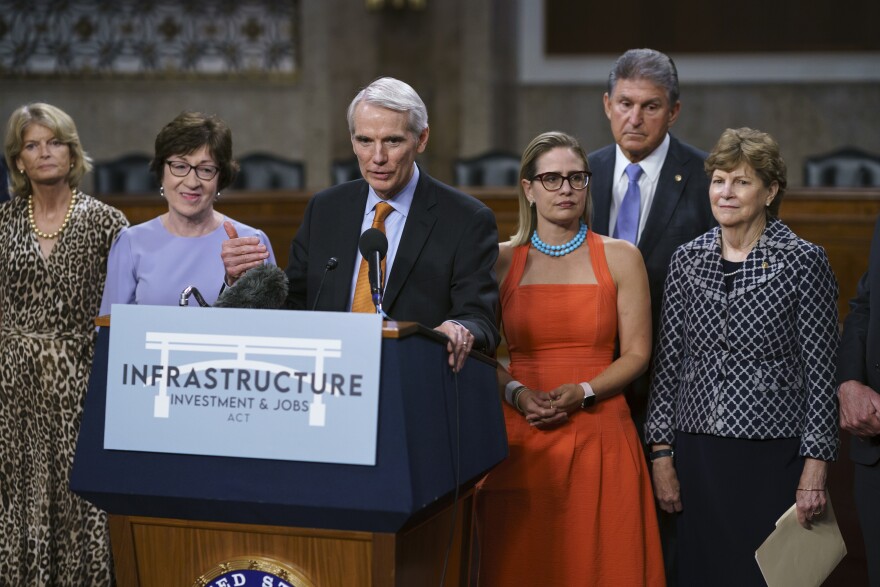The $2 trillion infrastructure bill approved by the U.S. Senate this week elicited a range of superlatives from U.S. Sens. Susan Collins, a Republican, and Angus King, an independent who caucuses with Democrats, in no small part because it marked a brief resurrection of bipartisanship, a hallmark of both senators’ brands.
In a written statement, Collins, whose moderate image was on trial during a wildly expensive effort by Democrats to halt her reelection, touted her role as a negotiator in the spending bill, calling it a “truly transformational package for our country.”
King was also effusive and sought to take credit for the inclusion of broadband provisions mirroring the Bridge Act proposal he helped draft earlier this year.

Meanwhile, President Joe Biden, who last year campaigned on his ability to partner with Republicans, took his own victory lap. He said he never believed skeptics who declared the deal dead weeks ago or those who called bipartisanship “a relic of an earlier age.”
Despite the celebratory statements, the infrastructure bill is neither a done deal nor is it likely to bring forth a new era of congressional comity.
The House is not expected to take a final vote on the proposal until the fall because Democratic House Speaker Nancy Pelosi is hoping to bring it alongside a separate $3.5 trillion budget bill that has already galvanized GOP opposition. Her plan is creating some angst for moderate Democrats, including U.S. Rep. Jared Golden of Maine’s 2nd District, who signed a letter to Pelosi urging her to decouple the two bills and bring up the infrastructure bill soon.
The anxiety among moderate House Democrats comes amid a steady barrage of attacks from Republican groups in their districts. The GOP objective seems pretty clear: The more the public views the bipartisan infrastructure plan as connected to the Democrat-led $3.5 trillion budget bill, the less credit so-called blue dog Democrats like Golden could receive in their districts for supporting the former and opposing the latter.
Attacks from one Republican group this week against Golden illustrate the point; the ads try to link him to the $3.5 trillion budget bill, even though he has made no commitment to vote for it. Golden was the only Democrat to oppose the American Rescue Plan, which dumped billions of pandemic relief aid in Maine.
Debate on the budget bill began in the Senate on Tuesday, the same day as the final vote on the infrastructure bill. The result, if you happened to watch C-SPAN’s coverage, was a whiplash between an exaltation of bipartisanship and the near immediate resumption of partisan warfare.
“You’re putting in motion, I think, the demise of America as we know it,” U.S. Sen. Lindsey Graham of South Carolina said during the debate. “You’re putting in motion a government that nobody’s grandchild can ever afford to pay.”
Democrats quickly noted their Republicans’ renewed interest in the national deficit after the GOP enthusiastically passed a massive tax cut in 2017 that added trillions to it.
The deficit double-standard will likely be just a part of the looming debate. The budget bill includes a range of Democratic initiatives that some polls indicate have bipartisan support — support that could crater when subjected to partisan messaging campaigns and the inevitable partisan sorting that often follows.
The initiatives include paid family leave, subsidized child care, an expansion of the child tax credit, expanded subsidies to buy health plans through the Affordable Care Act and broadening Medicare to include dental, vision and hearing coverage. To pay for all of that, the Biden administration has proposed hiking the corporate tax rate from 21% to 28% and capital gains tax from 23.8% to 43.4%.
Some Republicans have already framed the aforementioned provisions as sending the country careening closer to socialism. At the same time, 46 GOP senators have vowed not to help Democrats raise the debt ceiling, which determines how much money the federal government can borrow (Collins reportedly did not sign the letter.)
Those fights are expected to intensify in the coming weeks. The battles may not ultimately hinder final passage of the infrastructure bill, but they’re already tempering the bipartisan feel-good from this week.
U.S. Census releases redistricting data
After a long delay, the U.S. Census on Thursday released granular population data that will be used to redraw legislative and congressional districts.
Overall, the data show Maine added about 34,000 people between 2010 and 2020, but most of them were in Cumberland and York Counties. Seven counties lost population -- all of them in Maine’s 2nd Congressional District.
The losses in the 2nd District likely mean that the state’s bipartisan redistricting panel will have to push roughly 25,000 1st District residents into the 2nd District when it redraws the two maps so that both districts each have roughly the same number of people. Where the panel will end up is unclear, but 10 years ago nearly all of the redistricting negotiations centered on Kennebec County, which ended up with towns split between the 1st District and 2nd District.
Much of the focus will be on the congressional district maps because they’ll determine the electoral battlegrounds for the 2022 midterms and, potentially, make the 2nd District that former President Donald Trump won twice a bit bluer.
But the greater impact might come from legislative redistricting, which is governed by similar apportionment rules and could affect the future balance of power in the Maine Legislature.
Maine’s redistricting process doesn’t lend itself to partisan gerrymandering. That’s because two-thirds of the Legislature must approve the maps and it has been rare in recent years for either party to have a supermajority that would allow them to ram through gerrymandered districts.
Democrats currently have a trifecta, controlling the governor’s office, the Senate and the House. But they don’t have supermajorities in either the House or the Senate.
Biden’s chief of staff uses Maine to shame DeSantis
The continued march of the delta variant is spiking COVID-19 cases all across the country, including Maine.
But this week, when Gov. Janet Mills announced that 80% of all adults in the state had received at least one shot of the COVID vaccines, President Biden’s chief of staff, Ron Klain, took to Twitter to juxtapose the state with Florida’s progress.
Maine has been outpacing the Sunshine State in adults with at least one shot of the vaccine and percent of population fully vaccinated. In a tweet highlighting Mills’ announcement, Klain also noted that Florida’s hospitalization rate is 12 times higher than in Maine, per capita.
The COVID hospitalization rate in Florida is 12x higher than in Maine, per capita right now. https://t.co/ufVIppfq1e
— Ronald Klain (@WHCOS) August 9, 2021
The White House’s focus on Florida has been framed by conservative media as foreshadowing a potential presidential showdown in 2024 between Biden and Gov. Ron DeSantis, a Republican.
White House press secretary Jen Psaki dismissed that characterization this week, saying, “Our war is not on DeSantis, it's on the virus, which we're trying to kneecap."
She added that DeSantis "does not seem to want to participate in that effort to kneecap the virus, hence our concern."
DeSantis has emerged as a potential 2024 contender in part because Republicans are cheering on his approach to the pandemic. He loosened restrictions earlier than most governors and, more recently, he has taken a combative stance against mask mandates (He has advocated for vaccines, however). His campaign team has sold T-shirts saying “Don’t Fauci My Florida.” Last week, he threatened to withhold state funding for school districts that implement mask mandates.
NEW TODAY: Our team just dropped EXCLUSIVE merchandise on our brand-new @WINRED storefront.
— Team DeSantis (@teamrondesantis) July 12, 2021
Trust us… You don’t want to miss out on this. 👀
Shop the store and support your favorite freedom-loving Governor NOW! ⬇️🚨 #KeepFloridaFree https://t.co/618f3mrB5e
DeSantis’ administration was also at odds with Maine’s former health commissioner, Mary Mayhew. Mayhew, who led Maine’s Department of Health and Human Services Chief under former Gov. Paul LePage, is now CEO of the Florida Hospital Association (she was a lobbyist for the Maine Hospital Association prior to joining LePage’s administration in 2011). In various press interviews, Mayhew has warned in recent weeks that Florida’s hospitals could reach a breaking point if more is not done to control spread of the virus.
Mayhew’s warning turned out to be prescient.
Florida hospitalizations continue to set records. This week, the federal government sent the state 200 ventilators.
Meanwhile, DeSantis’ COVID politics might not be helping the public health crisis engulfing his state, but it has proven lucrative for his 2022 reelection campaign. He reportedly drew more than $4 million in donations from every state in the country last quarter.
New broadband agency gets to work
At least $250 million in federal money will flow to the state to expand and upgrade high-speed internet service.
A new quasi-governmental agency, the Maine Connectivity Authority, was recently created to oversee that effort. Its board was recently sworn in by Gov. Mills.
Timothy Schneider, who was Maine’s Public Advocate for part of LePage’s two terms as governor, is the chairman of the board.
Its first meeting will be Tuesday afternoon.
Click here to subscribe to Maine's Political Pulse Newsletter, sent to your inbox on Friday mornings.



